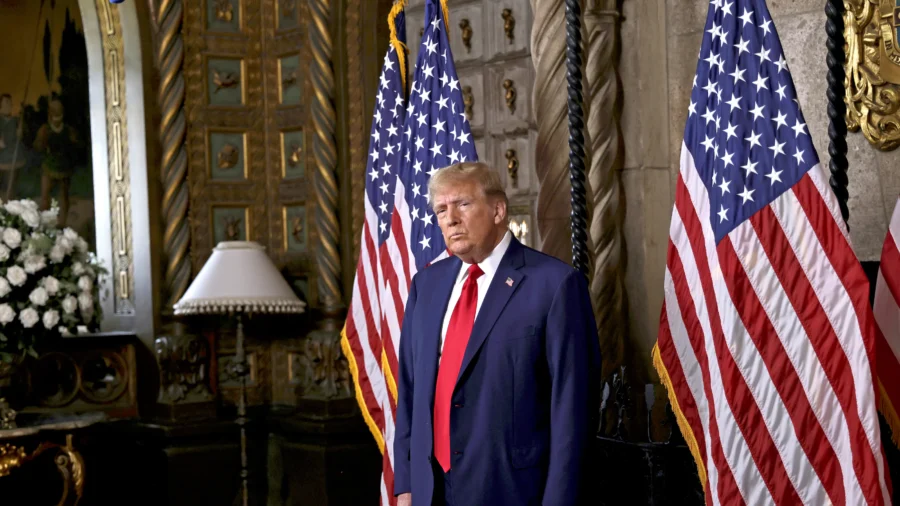Maine’s secretary of state on Monday withdrew her decision that had banned former President Donald Trump from appearing on state ballots, coming after the U.S. Supreme Court issued a ruling that overturned a Colorado court decision that similarly blocked the former president from ballots.
The Supreme Court on Monday morning rejected a December decision issued by the Colorado Supreme Court that barred the former president from ballot access, which applies to Maine Secretary of State Shenna Bellows’s unilateral decision in late December to block President Trump from appearing on her state’s ballots.
In February, an Illinois judge made a similar ruling, and all three cases used an interpretation of the 14th Amendment’s “insurrection” clause.
“The U.S. Supreme Court has ruled that individual states lack authority to enforce Section Three of the Fourteenth Amendment with respect to federal offices,” Ms. Bellows, a Democrat, wrote in a ruling obtained by several news outlets Monday.
“Consistent with my oath and obligation to follow the law and the Constitution, and pursuant to the Anderson decision, I hereby withdraw my determination that Mr. Trump’s primary petition is invalid,” she wrote, later adding that the Supreme Court ruling means that “votes cast for Mr. Trump in the March 5, 2024 Presidential Primary Election will be counted” in Maine.
Like Colorado, Maine is one of the 16 states and territories to vote during GOP primaries and caucuses on Super Tuesday, which will be March 5.
In a statement to Spectrum News, the Maine Republican Party hailed the decision and accused Ms. Bellows of trying to hand a win to President Joe Biden “via bureaucratic coup” and said “she has lost at every level of the Maine and U.S. legal system.”
Democrats in the state praised Ms. Bellows for her efforts, but they noted that the Supreme Court issues the final decision.
“Our focus has always been on connecting with Maine voters in their communities and defeating Donald Trump at the ballot box,” the Maine Democratic Party said in a statement.
Although President Trump had been kicked off the ballots in Colorado, Maine, and Illinois, the decisions were on hold pending the Supreme Court’s decision.
December’s decision in Maine made Ms. Bellows the first state official to ever remove a presidential candidate under the 14th Amendment. “I do not reach this conclusion lightly. Democracy is sacred,” she said at the time.
“I am mindful that no Secretary of State has ever deprived a presidential candidate of ballot access based on Section Three of the Fourteenth Amendment,” she added. “I am also mindful, however, that no presidential candidate has ever before engaged in insurrection.”

Supreme Court Ruling
The Supreme Court held that states may bar candidates from state office, but said they “have no power under the Constitution to enforce Section 3 with respect to federal offices, especially the Presidency.”
Ultimately, the justices sidestepped the politically fraught issue of insurrection in their opinions Monday.
While all nine justices agreed that President Trump should be on the ballot, there was sharp disagreement from the three liberal members of the court and a milder disagreement from conservative Justice Amy Coney Barrett that their colleagues went too far in determining what Congress must do to disqualify someone from federal office.
It’s unclear whether the ruling leaves open the possibility that Congress could refuse to certify the election of President Trump or any other presidential candidate it sees as having violated Section 3.
The three Democrat-appointed justices wrote that “the majority goes further” and has decided “novel constitutional questions to insulate this Court and petitioner from future controversy,” adding that “although only an individual State’s action is at issue here, the majority opines on which federal actors can enforce Section 3, and how they must do so.”
“The majority announces that a disqualification for insurrection can occur only when Congress enacts a particular kind of legislation pursuant to Section 5 of the Fourteenth Amendment,” the three justices continued. “In doing so, the majority shuts the door on other potential means of federal enforcement. We cannot join an opinion that decides momentous and difficult issues unnecessarily, and we therefore concur only in the judgment.”
Monday’s decision comes about a week after the justices agreed to take up a Trump-related case on whether he has presidential immunity from prosecution in connection to election charges that were brought against him by special counsel Jack Smith.
That decision is expected to be handed down later this year.
The Associated Press contributed to this report.
From The Epoch Times


